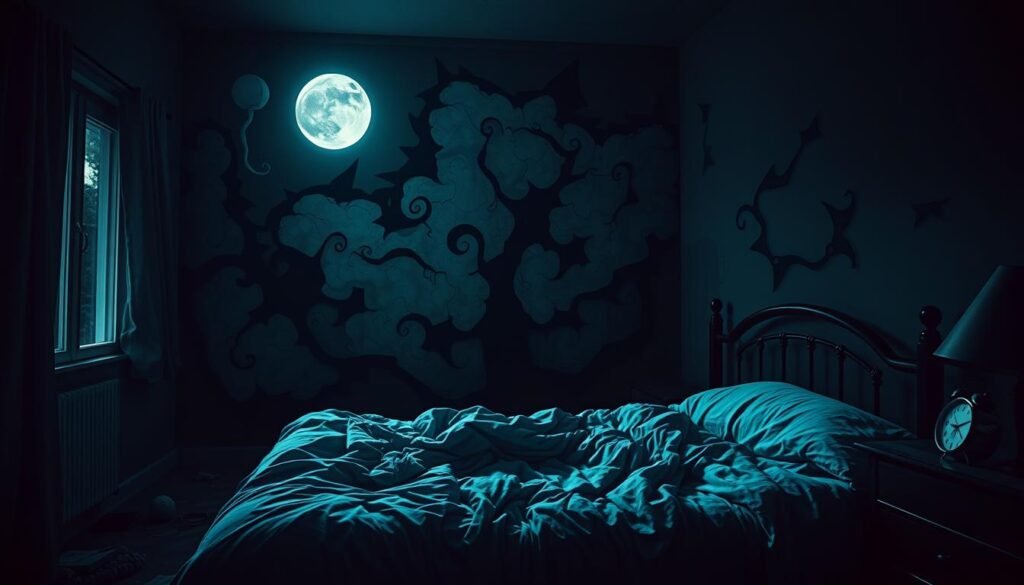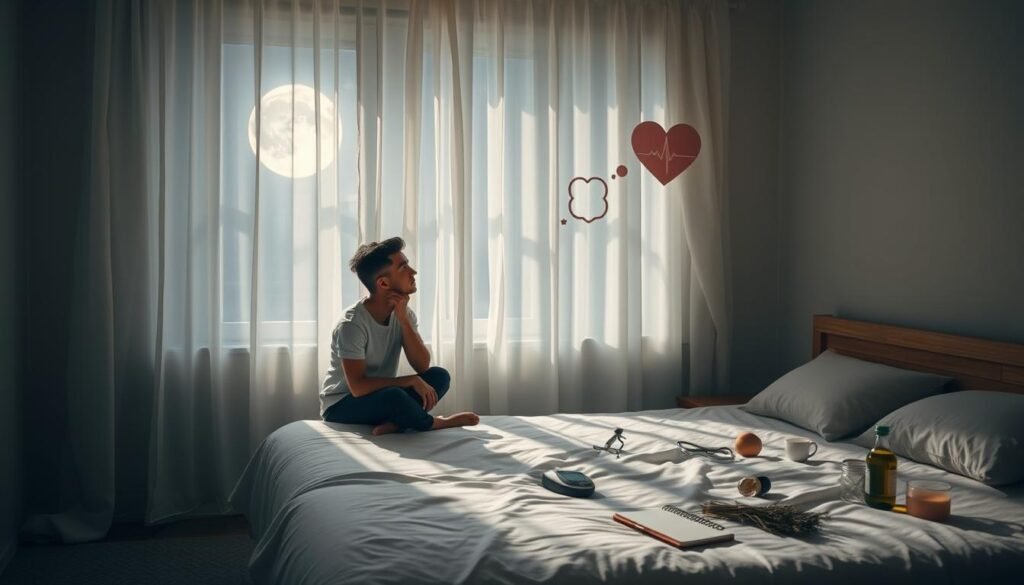Nearly 30% of adults will go through anxiety disorders at some point. It’s common to wake up feeling anxious in the night. This condition, called nocturnal anxiety, messes with sleep and daily life. It’s important to know why this happens. This understanding can prevent further anxiety issues.
Nocturnal anxiety comes from daily stress and sleep problems. Anxiety and sleep have a strong connection. Poor REM sleep can make it tough to process emotions. This leads to more anxiety and trouble sleeping. Learning how this works is crucial. It helps in finding ways to lessen the impact of anxiety at night.
Key Takeaways
- Anxiety disorders impact about 30% of adults, illustrating their prevalence.
- Nocturnal anxiety can disrupt sleep and contribute to ongoing anxiety symptoms.
- Stressful life events and sleep disorders often exacerbate nighttime anxiety.
- Developing effective coping mechanisms is vital for managing nocturnal panic attacks.
- Understanding the triggers behind nighttime anxiety can lead to better treatment options.
Introduction to Nighttime Anxiety
Nighttime anxiety is a state of fear or unease that happens at night. It often causes severe sleep issues. People with this condition may have trouble falling asleep, staying asleep, or may wake up suddenly feeling panicked.
Many adults, cutting across various demographics, suffer from nighttime anxiety.
About 20% to 45% of people with panic disorder have frequent nighttime panic attacks. And, 24% to 36% of people who have trouble sleeping also suffer from an anxiety disorder. This shows how daily stresses and anxiety are linked, especially at night.
At night, symptoms of panic can include losing control, chest discomfort, rapid heartbeats, and shortness of breath. Lack of sleep can make anxiety worse. This turns small worries into big fears at night.
Daily stress plays a big role in nighttime anxiety. Chronic stress, relationship issues, money worries, and health concerns are key factors. Not sleeping well, like using screens too much before bed, also increases anxiety. This is due to the negative effects of artificial blue light on melatonin.
Understanding and managing these factors is vital to tackle nighttime anxiety and panic attacks.
To lessen nighttime anxiety, effective strategies are crucial. Keeping a regular sleep schedule, practicing relaxation techniques, and mindfulness meditation can help calm the mind. By tackling the symptoms and causes of anxiety, one can enjoy a more peaceful night.
| Factor | Impact on Nighttime Anxiety |
|---|---|
| Panic Disorder | Increases likelihood of nighttime panic attacks |
| Daily Stressors | Contributes to heightened anxiety at night |
| Poor Sleep Habits | Leads to increased anxiety and worsens sleep quality |
| Health Concerns | Can trigger anxiety and result in sleep disturbances |
| Technology Use | Suppression of melatonin can cause difficulty falling asleep |
Understanding Anxiety and Sleep Disorders
Anxiety disorders are a major mental health issue in the United States, affecting about 20% of adults. They can greatly impact sleep patterns. For example, Generalized Anxiety Disorder (GAD) alone is seen in about 3.1% of the U.S. population. That’s roughly 6.8 million people.
There’s a strong link between anxiety and sleep issues, like insomnia. People with insomnia often feel more anxious because they can’t sleep. This leads to a vicious cycle where anxiety and sleep problems worsen each other. Understanding how they’re connected is key for finding good treatment options.
Panic Disorder and Social Anxiety Disorder are also common, affecting 2.7% and 7.1% of U.S. adults respectively. Different anxiety disorders can disrupt sleep in different ways. And many people with anxiety disorders report having insomnia. Treating both is critical in therapy.
Those with conditions like obstructive sleep apnea have a higher risk of anxiety. Lack of sleep can make mental distress worse, raising anxiety the next day. As night comes, worries might grow, making it hard to sleep well.
Getting to know the details of anxiety and sleep disorders is important. It helps realize the need for seeking help. For those dealing with both insomnia and anxiety, like GAD, there are specific treatments. Managing both can greatly improve life quality.
Common Symptoms of Nocturnal Anxiety
Nocturnal anxiety can cause different symptoms that affect our body and mind. People often experience a mix of feelings and physical reactions at night due to anxiety. This can be linked to not sleeping well and having panic attacks. Knowing these symptoms is important for dealing with and controlling this issue.
Physical Symptoms of Night Anxiety
Physical symptoms can include:
- Racing heart and palpitations that feel very strong
- Sweating a lot, even if the room is not hot
- Feeling dizzy or light-headed when you are awake
- Having trouble breathing, much like during a panic attack
- Feeling like you’re not connected to what’s around you
These signs are similar to those of a panic attack and they can make it hard to sleep. Your body might react as if it’s in danger, disturbing your sleep.
Emotional Symptoms of Night Anxiety
The emotional aspects often include:
- Fear and worry about the coming night
- Increased worry as the night goes on
- Getting easily upset and being more sensitive to stress
- Waking up a lot, which makes sleeping problems worse
By being aware of these emotional issues, people can start to find ways to help themselves. Doing calming activities before bed can help reduce anxiety and improve sleep. If night panic is a big problem, visiting Canyon Creek Behavioral Health can help you find support and treatment.
| Symptom Type | Symptoms |
|---|---|
| Physical Symptoms | Racing heart, sweating, difficulty breathing, dizziness, feeling detached |
| Emotional Symptoms | Dread, worry, irritability, frequent waking, stress sensitivity |
Why Do I Wake Up With Anxiety in the Middle of the Night?
Many people wake up feeling anxious in the night. This is often because of hyperarousal. This keeps the body on high alert. It can make sleeping hard, as the body is ready to act against danger. At night, worries from the day may fill your mind, making you feel more anxious.
Hyperarousal and the Fight-or-Flight Response
Hyperarousal is key in waking up anxious. It makes the body think there’s danger, turning on the sympathetic nervous system. This can make your heart beat faster and your muscles tense. Such tension disturbs sleep. People may wake up with their hearts racing, filled with anxiety. This might even lead to night terrors, making them wake up tired.
Daytime Stressors Impacting Nighttime Peace
Daytime stressors, like work or personal problems, can mess with night peace. This anxiety can slip into the night, keeping your mind running. It gets hard to calm down and sleep again. Using a worry time before bed may help. This lets people deal with their concerns earlier, lessening their effect on sleep.

Impact of Sleep Deprivation on Anxiety Levels
The link between not getting enough sleep and feeling more anxious has caught many eyes lately. Research shows that little sleep raises anxiety symptoms and emotional upset.
How Lack of Sleep Increases Anxiety Symptoms
Not sleeping enough hurts emotional well-being, decreasing happiness and increasing anxious feelings. Studies have found that over 30% of adults and close to 90% of teens lack enough sleep. This leads to off-balance body chemistry, causing more stress hormones like cortisol to be made. Such changes bring on symptoms like a faster heartbeat and more worry. It shows the need to solve sleep problems to lower anxiety.
The Cycle of Insomnia and Anxiety
Not sleeping well often starts a cycle of insomnia and growing anxiety. Those battling insomnia might see their anxiety get worse with ongoing sleep shortage. This causes a loop where lack of sleep fuels more worry and emotional upset. Research points out that poor sleep influences different anxiety types, including generalized anxiety and panic attacks. Cognitive Behavioral Therapy (CBT) is advised for treating both anxiety and sleep issues, aiming for better sleep habits.
Mindfulness can also aid in coping with stress and cutting down insomnia symptoms. It helps calm anxiety and leads to better sleep by focusing on breathing or how the body feels. A set bedtime routine and methods like progressive muscle relaxation also work well. For more on how not sleeping enough affects mental health, check out this resource.
Causes of Waking Up With Anxiety
Knowing why you wake up anxious is a step towards better mental health. Stressful life events and health issues can upset our minds. Learning about these reasons can guide us to manage stress better and improve our happiness.
Stressful Life Events and Their Role
Big changes in life can trigger anxiety. Losing a job, having trouble in relationships, or facing big changes can make us feel unsure. These stresses can raise cortisol, a stress hormone, making us more anxious at night. Some common triggers are:
- Changes in living arrangements
- Employment-related stress
- Experiences of trauma or abuse
- Loss of loved ones
- Financial pressures
Health Concerns and Physical Illness
Health issues also affect how anxious we feel. Chronic illness or discomfort can make us uneasy, especially when we’re trying to rest. Research links disturbed sleep and poor sleep quality with higher anxiety. Health conditions and anxiety can feed into each other, making each worse. Here are some health issues that may make anxiety worse:
| Health Condition | Impact on Anxiety |
|---|---|
| Chronic Pain | Can lead to sleep disturbances and heightened anxiety levels |
| Alcohol Hangover | May increase anxiety levels in the morning |
| Trauma-related disorders | Often worsen anxiety symptoms |
| Medical illnesses | Can amplify fears about health and mortality |

Effective Coping Strategies for Night Anxiety
Dealing with anxiety at night can make sleeping hard. It’s crucial to find ways to calm your mind and get your body ready for rest. By using different relaxation techniques, you can move into a peaceful state more easily. This helps a lot in getting a good night’s sleep.
Relaxation Techniques Before Bedtime
Relaxation techniques before bed can really help with nighttime anxiety. Trying things like deep breathing exercises, progressive muscle relaxation, or gentle yoga are great ways to relax. It’s also helpful to spend time away from screens by reading or journaling. Natural remedies like drinking chamomile tea or tart cherry juice can also help you relax and sleep better.
The Importance of a Sleep Routine
Having a regular sleep schedule is key to better sleep habits. Sleeping at the same time every night lets your body know it’s time to rest. Activities like a warm bath or soothing music before bed can make your bedtime routine more relaxing. A consistent bedtime not only gets you ready physically and mentally for sleep but also helps control anxiety at night. For more tips, check out this resource for finding community support and coping strategies.
| Relaxation Technique | Benefits |
|---|---|
| Deep Breathing Exercises | Reduces cortisol levels and promotes a sense of calm. |
| Gentle Yoga | Helps ease muscle tension and promotes relaxation. |
| Chamomile Tea Consumption | Assists in reducing anxiety and improving sleep quality. |
| Tart Cherry Juice | Increases melatonin levels, aiding sleep duration. |
| Consistent Bedtime Routine | Signals to the body when it is time to wind down. |
Professional Help and Treatment Options
If anxiety is ruining your sleep, it’s crucial to get professional help. There are many ways to manage anxiety effectively. The main methods are behavioral therapies and taking medications.
Behavioral Therapies for Anxiety Management
Behavioral therapies are great for controlling anxiety. One key method is Cognitive Behavioral Therapy (CBT). CBT changes bad thoughts and actions into good ones.
It gives people tools to handle negative feelings tied to anxiety. These tools are very practical for everyday situations.
- CBT aims to break the cycle of anxiety by addressing the triggers.
- Therapists often incorporate exposure therapy to gradually confront fears.
- Relaxation techniques, such as deep breathing exercises, complement therapy for better results.
Role of Medications in Treating Anxiety
Medication is also key in treating anxiety disorders. Drugs like SSRIs and benzodiazepines greatly reduce symptoms. Choosing the right medication depends on what each person needs. This helps improve the way we manage anxiety.
| Medication Type | Common Uses | Examples |
|---|---|---|
| SSRIs | General anxiety disorders | Escitalopram, Sertraline |
| SNRIs | General anxiety and depression | Venlafaxine, Duloxetine |
| Benzodiazepines | Short-term anxiety relief | Diazepam, Lorazepam |
Medications might need some time to work, but many see their anxiety lessen in a month or two. Finding the right help and a plan that’s just for you can lead to better handling of anxiety.

Creating a Comfortable Sleep Environment
A good sleep environment is key to better sleep and less anxiety at night. Things like temperature, light, and noise make a big difference. Making small changes can really help improve your sleep, especially if you often feel anxious.
Environmental Factors That Affect Sleep Quality
Several aspects of where you sleep can either help you relax or keep you awake. These include:
- Room Temperature: A too-warm room can make it hard to sleep. Keeping it between 60-67°F (15-19°C) is best for comfort.
- Light: Light at night can stop melatonin, which you need to sleep. Dark curtains can help keep your room dark and peaceful.
- Noise Levels: Loud noises can wake you up. Using white noise machines or soundproofing can help keep it quiet.
Suggestions for an Anxiety-Free Bedroom
For a bedroom that helps reduce anxiety, try these tips:
- Choose a comfortable mattress. The right mattress improves sleep quality.
- Use supportive pillows. They help keep your neck and head in a good position.
- Keep gadgets out of the bedroom. They can make it harder to fall asleep.
- Have a bedtime routine with quiet activities. It helps prepare you for sleep.
- Avoid heavy or spicy meals before bed. They can upset your stomach and disturb sleep.
Creating the right sleep setting can make a big difference. It helps you fall asleep faster and stay asleep longer. This can help reduce anxiety and make you wake up feeling refreshed.
Long-Term Solutions for Managing Anxiety
Finding long-term solutions can greatly improve the well-being of those with anxiety. Key strategies include regular exercise and mindfulness practices. These methods help manage symptoms and lead to a healthier life.
Regular Exercise and Its Benefits
Regular exercise greatly benefits mental health. Walking, jogging, and yoga can lower anxiety levels. They do this by releasing “feel-good” hormones called endorphins.
Rhythmic exercises break negative thought cycles, giving a sense of achievement. They also help improve sleep, which is beneficial for nighttime anxiety sufferers.
Mindfulness and Meditation Practices
Adding mindfulness and meditation to your daily life can help manage anxiety. Techniques like deep breathing and guided meditation focus on the present. They help control emotions and develop coping strategies.
Engaging regularly in these practices builds calm and stability. Meditation enhances emotional strength and overall mental health.
Conclusion
Many people wake up feeling anxious during the night. This problem can come from different things like stress, health issues, and anxiety disorders such as Generalized Anxiety Disorder (GAD). Knowing why it happens is the first step to dealing with it. This knowledge helps improve sleep quality.
To deal with nighttime anxiety, it’s important to have a good bedtime routine. Relaxation techniques and changes in what you eat can help too. Practices like mindfulness and deep breathing can make your sleeping area more peaceful.
If anxiety is hard to manage, getting professional help might be needed. Therapy and maybe medication can offer the necessary support. Being aware, using strategies, and seeking help can lower anxiety at night. This improves sleep quality and overall happiness.